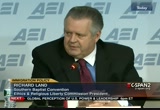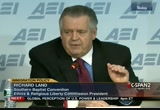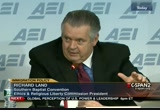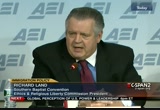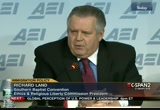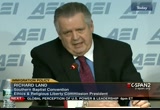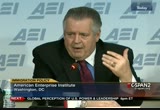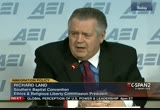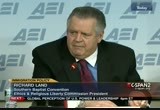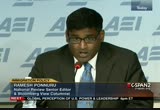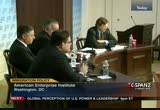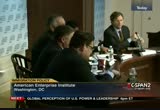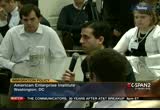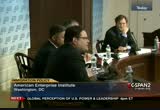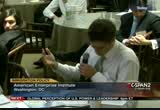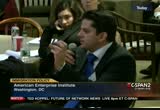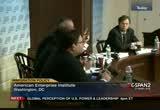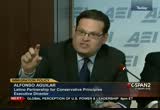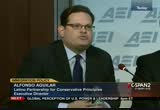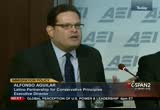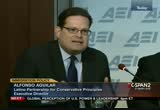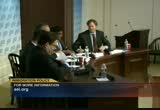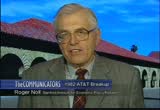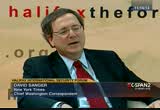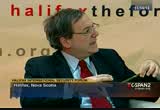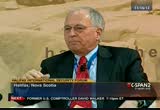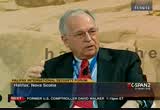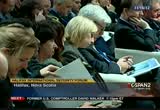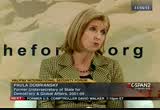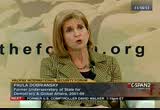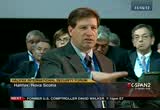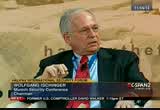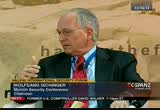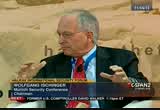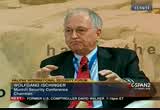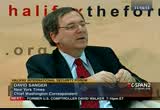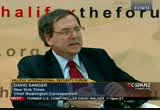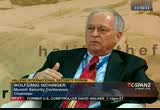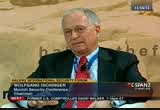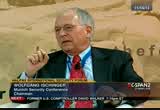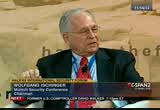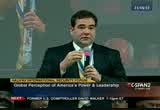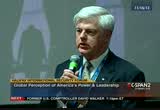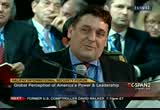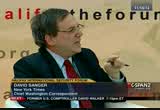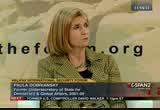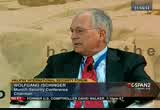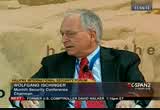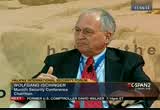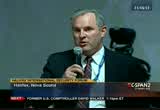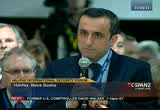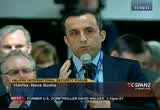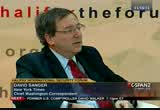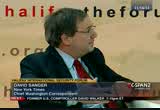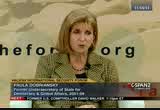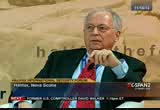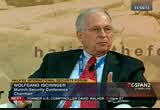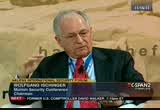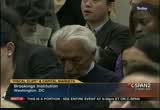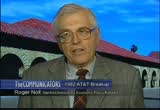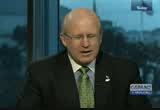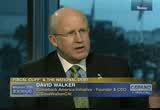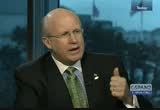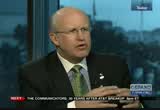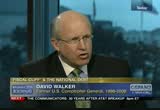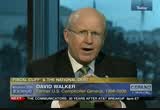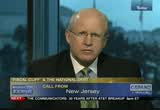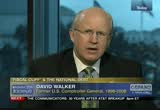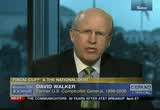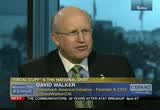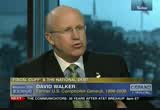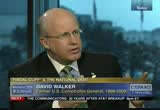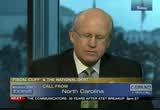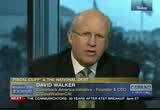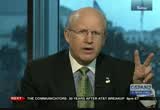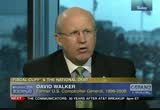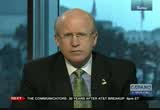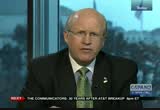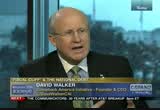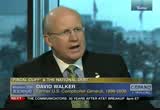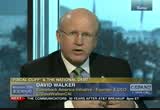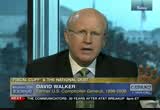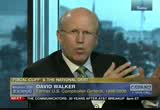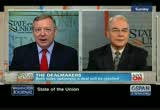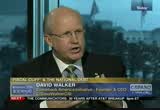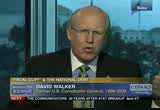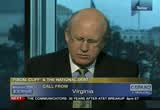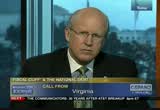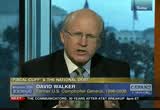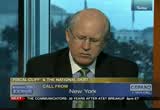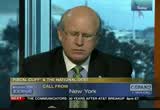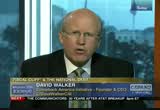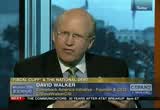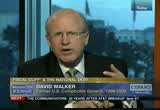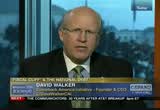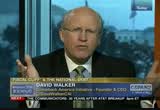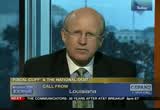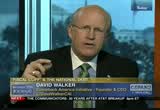tv U.S. Senate CSPAN November 19, 2012 5:00pm-8:00pm EST
5:00 pm
not a picture, but a thumb print, and give to every american a new social security, not the antique we give since 1936, that also has some form of identification on it, probably a thumb print, once, again, not a picture, a thumbprint, and them you say to employer, hire someone who doesn't have this identity card or a new social security card, and you're going to go to jail for six months. that will turn off the magnet. ..
5:01 pm
who are using undocumented workers. that will cut down the flow by about 90% of the border. that makes it possible to secure the border for those that are trying to come across for nefarious purposes for criminals enterprises. we can stop them at the border. then we say to those that are here in an undocumented status you are on probation paying a fine and this is to me what i find when i talk to people the most emotional issue in all of this is language. i find americans across the generations don't want us to have to sing the national anthem in two languages at the world series. they won the national anthem in
5:02 pm
english even if they were american. so they have to agree if they want to stay here permanently they have to agree to read, write and speak english. i find that among the undocumented workers they have no problem with this. they want to learn english. they understand that to live the american dream they have to learn to speak english. it's only liberals who inhabit college campuses and education departments who have a problem with english becoming the primary language and asking people to learn to read, write and speak english. then he you have a sliding scale where you say to people if you've been here for 20 years, and some of them have them we have had to signs of the border for the last 20 years. one says no trespassing and the other one says help-wanted. yes it's wrong to break fell all and it's also wrong and immoral not to enforce it for 20 years
5:03 pm
and then retroactively say now we are going to enforce the law. the way that i explain that it would be like the federal government sending me a bill saying we haven't given you a speeding ticket for the last 20 years but we have been monitoring your driving habits on the highway, and we've noticed that you consistently break the speed limit on the interstate, which i do. it's my right to a my car, not to drive it. [laughter] 85 miles per hour in parts of texas is the speed limit. amen. by the way we are going to give you a fine for every time you broke into law and we are going to confiscate your car until you pay the fine. i have to go to the bank to get a loan and i would think i've been treated unfairly. it's not fair to then say retroactively we are going to enforce law now. that is a moral. we say to people that have been
5:04 pm
here a long time you are on probation for four years, five years and then you have permanent legal status. once they get permanent legal status at some point they are going to be able to get citizenship, but permanent legal status will get us to comprehensive immigration reform faster because it would eliminate one of the major political hurdles to getting us there. then we need to have a guest worker program. we need guest worker programs and i think it's better to have them run by the states where you would have an opportunity if you offer a job and a wage and for 30 days no one takes it than you can go to the preapproved pool of people who want to come here and do that job and they can come here and do that job for a certain amount of time and then they have to -- you have to offer it again to someone if an american worker doesn't want it than you give it to someone else. it's also in our enlightened self-interest to have the immigration reform to i would
5:05 pm
encourage you to go to the council on foreign relations web site and see their task force report cochaired by jeb bush that points out the country that is going to lead the world in the 21st century economically is going to be the country that can amass the largest mass of brain power no matter where it was born to do its research in this country. we start off with a head start because we are a nation of immigrants but there are other countries that are competing with us. anybody that gets a ph.d. from an american university i don't care where they were born we ought to steeple a green card to their diploma and encourage them to do their work here if we want america to be the country that leads the world in research and innovation in the 21st century,
5:06 pm
and as an american i want that to be the united states. this is an issue that can be solved. the american people are way ahead of where their elected representatives are coming and i look at the composition in this room and there is a generation gap. i find that the older people are the less receptive they are to immigration reform the younger they are the more receptive they are to immigration reform, and i have a column in the post that i would encourage all of you to read called the night of the gop began to lose the 2012 election and that was the night that governor rick perry got booed by the audience for defending in-state tuition were for the children of undocumented workers
5:07 pm
in texas which passed in 2001 with only five state legislators voting against it. do you know how difficult it is to get all but five texas state legislators to agree on anything? it's almost impossible. they won't even agree on what time the sun came up, but they agreed to this legislation because a was right for texas and for these young people. this is the low hanging fruit. they've done nothing wrong with. they've broken no law. they are here because of their parents' actions and i don't believe the united states of america is a country that wants to punish children for their parents' behavior. these young people want to be americans, they want to improve themselves and be contributors to our economy, and it is a moral for us to put barricades in their path and frankly as a republican why was ashamed of my
5:08 pm
party for their behavior that night. they ought to apologize. i can understand why hispanics would say republicans don't like us. that's not true but you wouldn't know it from that behavior that might. and it's time frankly i am just going to make a judgment call. it's time for us to stop listening to the people with the smallest brain and the biggest mouth. [applause] skill aye next up is a person with an enormous brain so we will go to him next. >> not as big as my mouth, however. [laughter] >> thank you all for coming out tonight. a lot of the themes and concerns are the conservative immigration policy that have already been discussed here. matters having to do with economics and the morality. so i figured what i would do is talk a little bit about an issue
5:09 pm
that i think tends to get a little underemphasized about immigration and that is assimilation. people read different things when they use that word. what i mean in saying that our immigration and post immigration policies ought to be towards assimilation is simply we should want newcomers to the united states to have a good shot at becoming successful americans who can support themselves rather than rely on taxpayers who can and do fully participate in local, state and national political deliberations to participate in our culture and who see themselves and are seen by others as americans. these are things that we should take steps to achieve. assimilation shouldn't mean the elimination of what is distinctive about the immigrant cultures. the assimilation i have in mind is compatible with immigrants
5:10 pm
changing and enriching the national culture but the important thing is that newcomers and native-born americans alike have a shared sense of belonging and consider their interest to the common interests rather than antagonistic and to be able to communicate with one another. the immigration policy that takes assimilation what i think look different to respect what we currently have and from some of the proposals that we often hear about. i think pretty obviously of assimilation is the goal then we want to make as much of our immigrant inflow to be legal rather than a legal and illegal the on the part of a large population is a pretty obvious challenge to that goal. i think it also stands to reason that we should be mindful of the fact that it's easier to assimilate and the population the more diverse the character the less it is dominated by
5:11 pm
immigrants from one particular place and also that it's easier and smaller that inflow and it's also i think stands to reason that we can successfully absorb more evidence the more care we take to equip the new immigrants with the skills they need to make it in the u.s.. for example as richard mentioned by making sure that they and their children receive effective english language instruction. we tend to talk a lot about what to do about illegal immigrants who are already here whether to provide them with what some people call the legalization and other people call amnesty and on both sides lot of the arguments or moral. one group suggesting legalization would erode the rule will fall and another saying it's the status quo that undermines the rule of law and decides that he man to lead to a humanitarian duty to regulate the status of the people who come here over the last few
5:12 pm
decades. well, my own reading of the polls is that the answer is that people give to a lot of questions depend a lot on the wording of the question which suggests to me the polls are useful for identifying some impulses that are strong in the public and not so much for finding specific policies. the impression i have is that most people are not opposing the principal to allowing people who've been here for many years and meet certain other conditions to get legal status. but i also think that most people don't feel obligated to provide this legal status if there is a danger that providing it would yield more of the immigration and the future. it would just for made part of the cycle of the ineffective and fundamentally not serious national policy.
5:13 pm
a lack of trust in the federal government and the national politics seems to me to have been and to continue to be the most furious obstacle to the achievement of an immigration policy that looks like an ought to have a consensus behind. the more people have confidence in the enforcement, confidence and enforcement of the border and again as richard set up the work place the more i suspect it would be willing to support the legalization, amnesty or whatever you want to call it, and i think that consensus would include an awful lot of conservatives but what strikes me as more problematic in principle than the legalization and a lot of proposals on a year about in the immigration reform is the idea of temporary work authorization to read and i think that we can all understand the impulse. you want to meet the needs of business especially for jobs that most americans are not interested in taking into the
5:14 pm
same time you don't want to raise the hassle of those that don't want as much immigration but i am skeptical that these proposals can work. for example, if temporary workers who are here have children while they are here who would be u.s. citizens under prevailing interpretations of the constitution will we really deport the parents or would the same consideration that moves many people to view enforcement of the law as harsh under the current conditions lead us to flinch from enforcement in those conditions as well? all of the arguments about family values not breaking up families would apply in such cases. if e-verified doesn't work as i often hear from proponents of immigration reform why would we expect the federal government to a great job of running the background checks and enforcing the time limits that kind of
5:15 pm
policy would entail. but beyond these practical concerns i often fear this policy sends a message and the particular message to hispanics that we want to benefit from your labor but we don't want you to be full participants in american life and we don't want you to have political power. that is an antiassimilative message. it has typically been conservative immigration reform have been the most positive about the temporary work programs and it's been the leader left that's the most opposed to it with the letter urging that having a large group of workers without full rights is a step backwards for our specific ideals. i am a conservative and i'm not delete connaughton that sympathy with labor but this seems to me to be a reasonable argument and the correct argument. it's no secret that conservatives have long been divided about immigration and the election results. i don't expect to resolve these differences here. but as somebody that find some
5:16 pm
soften between the major conservative camps on this issue or a couple of suggestions to words bridging the gaps, for the enforcement only folks i think the most important thing i would have to say is it is crucial in what you say and what you propose you acknowledge how reasonable and understandable it is that people would break the law to come here to build better lives for themselves and their families. you don't have to believe that is the right thing to do. you don't have to believe the government should allow a. i don't think some of the people on this side of the the date see how easily the condemnation of the behavior can come across as personal hostility to illegal immigrants in and even to hispanics and asians in general. it's much better to stick to the critique of institutions and policies rather than of people riding on this issue. for the folks that want comprehensive reform i would say
5:17 pm
take seriously the concerns people have expressed about enforcement and the sometimes unexpressed concerns the have about assimilation. a couple of people have mentioned rick perry. let's not forget i think the basic principle if you want to persuade people who do not already agree with you to come around to your position, calling them heartless may not be the way to go about it. don't approach this as a purely economic issue. don't approach it as a matter of maximizing the vote share of one party or another. a temptation by the way i'm happy to say was avoided on this panel. family values, economic efficiency, the rule of law, national cohesion, these all good conservative themes and the need to be respected and brought into alignment with one another. thank you. [applause] >> thank you very much. i want to go to the audience for
5:18 pm
questions in just a second, but i will take the moderator's prerogative to ask the question of the panel and i naturally going to break level but i said at the very beginning and i want to talk politics for a second which is the worry in the wake of governor romney doing some polling among hispanics it seems obvious that republicans conservatives may want to change as the approach the immigration issue and while i can't certainly know that this is true i always suspected that governor romney wasn't a hardliner on the immigration issue as he came across. i think there was a question of he had to win his party's primary yet he calculated accordingly and crafted a policy approach and rhetorical approach
5:19 pm
in keeping with that. nothing that has happened would seem to be necessarily to have changed that fact for the republicans who need to win the party nomination in order to -- i am wondering if any of you would choose to comment on that fact that this is a reality of winning the party's nomination. >> i guess going back -- not only are we going through this introspection people say we need to understand latinos i think we have to understand our own conservative base. and i think we saw that in the primary, and i will give you one example, new gingrich. his approach to immigration was actually pretty good. it was constructive. and remember the last debate of 2011 where he said he confronted
5:20 pm
michele bachman and he said white you want to be part so many people? i wanted to find a common sense approach to deal with this issue. he didn't go down in the polls after he said that. he actually surged and he wound up winning south carolina. the restriction nests would like to argue that governor perry went down in the primary because of the position on immigration. he went down because we all know he had a problem in the the date. >> which had to do if the medication he was taking on back surgery. he's not the most pyrrophyte that he is more than he appeared. estimate of the whole point -- >> when you kuran the primary you will have some in the conservative base that will be angry about having a position on immigration but you're not going to lose the primary because of
5:21 pm
immigration and i think that's where we start. the problem is that the candidates were being fed from the very thought from down because i remember how he reacted when they came out with the immigration saying that is the minority view. >> i was going to say, you know, look, you have to understand that if you speak out on immigration reform and you are in favor of it, you are going to get this tidal wave of manufactured astro turf. they're really is astroturf that appears to be grassroots. when i came out on this, i got attacked -- we got like 3,000 e-mails in my office all the same e-mail by the way generated by this grass-roots organization that then started this campaign attacking me because of a after
5:22 pm
all was a member of the council on foreign relations. [laughter] you just have to buck up and say okay. shut up and continue. i got attacked for coming out in favor of immigration reform and encouraging my denomination to give immigration reform and then lo and behold we got to the convention which is, you know, thousands of people elected by their local churches to come and represent their churches from all across the country and in 2011 in phoenix we voted 87% in comprehensive immigration reform. the southern baptist convention. the most conservative evangelical denomination in the country. i think that the republicans and those that want republicans to win need to understand that there are highly organized
5:23 pm
groups that have a vested interest in fermenting anti-immigration feeling. and the only way to defeat them is to confront them and to shame them. as far as i'm concerned, rick perry was being charitable when he called those that booed part list. i can think of other less charitable names they could have been called. as a historian, i would say folks, the nativists have lost every one of these debates from the revolutionary period until now they have lost every one of these debates. if you want to be on the losing side just be a nativist. >> i think it's a recent trend.
5:24 pm
you go back to then governor bush and how he didn't pander to them during election time he tried to speak to them and appointed them to the boards and commissions and he did that in 2004 and we got 44% of the vote and 49% of the vote. working shoulder to shoulder i can tell you that they don't like pander in either they don't enjoy the political process and we need a party that learns from that. but what has recently happened is these groups that are highly financed and highly funded that have infiltrated the conservative movement get us fighting and their solution is no, no, deport, deport.
5:25 pm
its population control, the environment and they don't have anything in common with us. they get a peak of did a couple people they have out front to be their conservative individuals but if you really start peeling back the leaders of the onion and will make you cry. it's not conservative at all. they've got us fighting on this issue so much that the national conservative authors are claiming that it's one of the conservative principles. we need to use our conservative principles to address our problem and i think that is what has happened to the recent and it's not just about trying to win the election but grow the party and welcome people and we are wanting you to feel like you are at home. many to learn that in their
5:26 pm
rhetoric that has been displayed and is doing more damage than it is good. >> i should preface my remarks on this by saying i am in complete agreement that conservatives and republicans need to do a better job or some cases a job for the first time to appeal to hispanic voters and other nonwhite voters but we shouldn't kid ourselves about some of the obstacles we need to start with an accurate look at some of these numbers and we should look for example of the fact that claim that bush got 44% of the hispanic vote in 2004 was retracted. he got something closer just 38 to 40%, still could but let's use accurate numbers.
5:27 pm
let's also not kid ourselves that hispanic voters care first, foremost and only about immigration and that once you've solved that problem you are going to win. it may be something that helps you have an open door where they are going to listen to the rest of your message. i'm not suggesting otherwise but they've also shown most hispanics favor the president's health care law and they give a different answer than the ones the conservatives to to the question about do you want a bigger government with more services or smaller with few services. so on issue after issue these are voters that disagree on a lot of policy issues also talk about the funding there are certainly well funded organizations that can come up with advocacy goals on the other side of it.
5:28 pm
i would just point out reagan was not only welcomed into this, he actually enacted amnesty that people at that time were willing to call an amnesty and in 1980 the republican candidate for president got 29% of the hispanic vote so this is the magic key. then last i would point out one of the problems republicans had in this election was not just that bad showing among hispanics but a lot of a white working-class voters didn't turn out and if you are trying to figure out what to do about that problem as a republican coming out for anything that can be described as amnesty wouldn't be at the top of your list. again, not to suggest that there shouldn't be changes as the republicans' approach to
5:29 pm
immigration policy and of reach to different groups but i'm here a lot of naivete about solving these problems. >> i think it's important to know we always look as a party of the senator like ted cruce and marco rubio is leading this fight and we have governor martinez and mexico and the governor in nevada. these are people better leaders in the party right now. so they can act with what our beliefs are. they generally connect with what our beliefs on this issue of immigration in the last eight to ten years has become for third real politics in the country where you don't want to talk about it. when mitt romney was asked about immigration, it was like a very awkward he talks about
5:30 pm
immigration and that is what our party needs to talk about. >> just a couple ground rules we ask that you wait for a microphone to come around and that you state your question in the form of a question. as we have a question right here and then we will go over here. >> there seems to be disagreement on the panel about whether there will be the way to go forward or not and from the assimilation view this is a good way to work they can come in legally and we can take some strain of the black market entry and provide businesses with what they need. it seems like most immigrants throughout the history of the united states have come it is a circular flow they want to come in for five, ten, 15 years and go back to their home countries
5:31 pm
with the savings that happened essentially before as well. since we are not going to get a massive increase in the green cards to make up for the workers that come in my tent the guest worker programs phyllis more effectively? as someone that can work well given. >> i think it can. i think it can. the report shows that 40% of the people that are here and the undocumented status don't want to stay here permanently. and they want to come here, make money, go home and open a grosz in monterey for the same reason a lot of our retirees are moving to mexico because the dollar goes a lot further right now in mexico than a dozen the united states. and if we had a border with we controlled and they to go back
5:32 pm
and forth so they wouldn't be risking their lives to go home and visit their families you would have more of these people who would come here and work a certain number of years and then go back to their country of origin. if 30% of the people over here in on documented status didn't come here. i do think assimilation if we had a legal immigration policy that worked and gave a pathway for the undocumented they would begin to assimilate at the rate that the immigrant groups have assimilated. the undocumented or not assimilated at the same rate because they have to stay in the shadows. they're subject to exploitation for unscrupulous people that prey upon them and.
5:33 pm
>> it's important as we begin this discussion which is circular migration and that's something that -- that's why we are in the problem that we are in. he addressed the issue of those that come here who don't want to stay. they stay here because to go back with ne they are leaving and re-entering illegally but let's also look at the guest worker program not only as a function of the needs of our economy it's also the family approach. you know how many families we have broken out in mexico and in central america? people that come here to work leave their spouses, their children back home they have a commitment to send remittances but then they start families here in the united states. it's breaking up families. so we can't guarantee for every
5:34 pm
single forum a person that enters the u.s. it have to citizenship, so i think we have to adopt to this concept circular migration and you see a lot of people perhaps the majority wanting to come here to work and return to their country but we have to make it flexible so they can go back to mexico and then re-entered but as to reflect the needs of the market. i think it is precisely the unions that make this argument that the guest worker program is some sort of servitude that the only way we can allow immigrant to which the path to citizenship that is ridiculous in terms of not increasing the number of green cards, not sure we are not going to get to that discussion. governor romney for example the proposal he made in the primary which nobody paid attention to was doing away for their
5:35 pm
relatives that perhaps is an interesting approach to facilitate legal immigration and unification but i think that's something we have to consider as well to facilitate more legal migration and allowing people to be here permanently. >> they haven't been effective at running the guest worker background checks but we also need to look at how the states handle it. we have a driver's license apartment and the facility and the means to do this. the work a lot better. go home for thanksgiving and stay for a week. i promise you it just kind of gets gridlocked but it's not just about getting the cheap
5:36 pm
labor. i believe in the assimilation portion that we need to start with that and then create a way to become citizens where they can vote and become citizens but that is the debate we need to have a talkative 50,000-foot level. but we need to make sure that we have this discussion and start with solutions on the rhetoric. >> i think that we may have just witnessed a first which is somebody holding up the dmv has an example of the efficient government at work. i guess it is like a whole other country. look, it may be that folks who are skeptical of the comprehensive reform plans are just ignorant and heartless and some also diabolically well-founded. but i think folks that are for these reforms the have to stop and listen to themselves and
5:37 pm
think, you know, if i'm saying this is all going to result in the circular flow and is all going to work out perfectly and it's not going to be -- and it's been to be perfectly administratively feasible and yes we will have the political will to enforce the limit on the guest worker program where we haven't had the political will to do so yet and in fact our lack is one of the main reasons we have for giving for this may be people are just not going to quite buy it and the other thing i would say if we are talking about the politics, the temporary worker program if the impetus here is in large part there's a political problem for conservatives and republicans, that cannot possibly be the solution to it because he would be instantly of slang and the r. dee argument that says you want folks to work hard here and you don't want them to become citizens, and you don't want them to become voters or half
5:38 pm
full political rights. that isn't going to be a winning message. you will always be looking like you are stingy and more hostile to hispanics and what is more, that argument is correct and that's why it's going to have that. >> we have a question here and then we will come back to the gentleman. >> my question is related not to the cheap labor or the highly qualified ph.d. holding member but rather someone that went through undergraduate school and is trying to find a place in society that it's always attached. that's what i see as the most which is your always attached to your employer. you lose your freedom of the movement and part of the free market of labor that americans have taken for granted scarier than having your healthcare attached to your citizenship is
5:39 pm
having been attached to your employer. how do you address this person that isn't in the lower tier but also the averages just a middle class type of person that fits what makes a part of the american society? >> a part of the process we have the two mechanisms which is the family based full employment base so even those that come here to work, they could be petitioned as immigrants and eventually become citizens. the question is perhaps we need more immigrant leases for the workers.
5:40 pm
one of the interesting things that happened in the last conference which again wasn't reported because it was a bill introduced by congressman of utah which passed the house by a vote of 385 to 15. i haven't seen that type of bipartisanship since immigration and a very long time and what he did was gave -- he did away with a quota for the employment based, the country based limits for the employment base and i don't peace and for the family base and increased them at double the them. so i think there's room here because we do need people with advanced degrees and normally if it is an employment based job, i think we need to increase that number so there is more
5:41 pm
available so that more can become citizens. >> i completely agree i think that the linkage to a particular employer is a deeply problematic part of this policy. i think if you want an immigration policy that meets the u.s. economic needs then maybe what you do is cut back on the use of immigration to the extended families and increase the skills, skilled immigration and not have it so tied to the particular employers precisely to serve the cause of the labor markets. >> one of the things the council on foreign relations did and we wrestled with this is cut back on extended families and keep it to the nuclear families because the numbers could astronomical otherwise and it opens it up for the kind of thing you're talking
5:42 pm
a lot. the whole system needs to be fixed but i think we need to understand something. we are a unique country. we are the only country in the world where anybody can become an american if they are willing to pledge allegiance to the secular creed laid out in the declaration of independence they can become americans and since you can't become english or french if i lost my mind i could probably go through all of the legal provisions and become a citizen of france. of that thing god would still not make me a frenchman. you know, anybody can go to the legal provision and become an american and the great thing about our country i lived in england for three years and i enjoyed it but compared to america, england is a really boring place and the reason is every one of our immigrant groups that have come to this country even the ones that were
5:43 pm
brought here forcibly, jazz, our cuisine, our language, everything has been enriched by every immigrant group that has come. they have contributed to our culture and we are not saying that you should suppress that. we have columbus day parades, polish american parades', cinco de am i yo and we even have anglo-american celebrations. i had a reporter say what does that look like? i said you've never been to the revolution meeting? it isn't much of a solution but it is a commemoration. you know, as long as the emphasis has to be on the right you are an italian-american, you are an anglo-american, hispanic american and i talked to somebody from germany last year who chose to become an american and i said why? he said you have so much more
5:44 pm
freedom here. in germany there are tremendous expectations about what you're supposed to do and how you're supposed to behave and based on your family background. here you are free. we want people who yearn for that freedom to come to the united states. they always have. we want them to continue to do so. it is what makes us americans. we have a question down here. >> mabey if you could ask your question and then ask both of them and we will try to take them. >> i'm a comedian working in the u.s. on an h-1b visa, a process that i wouldn't wish on my worst enemy. and compared to my weisel when i was in singapore it was approved overnight. my question is how would you address the reform for those that want to come to the u.s. to work? and i would agree on the point that the emphasis here is on the
5:45 pm
work in the american tradition what we have to only get a job in which case i wouldn't be doubled to be here and i would point to the cato institute that mentions the market based signal on the economy and to boost wages for all levels? thank you very much. >> go ahead and ask the question and we will address both of them >> it has to be a democrat so my question is different from him. i wanted to get more to the political sphere how can the republican party become a party again the way it was during ronald reagan? i feel that the republican party is just slowly and slowly
5:46 pm
becoming smaller and smaller and smaller party began throwing people out like me for approval to become republicans and you're not a real republican and things like that and the democratic party is doing the opposite. they were the small party, very small when the 70's and 80's and now they are the inclusive party. latinos are bringing in -- well, the blacks before hand bringing all these other groups in the republican party to switch and start to be more of an inclusive party. >> why don't we take the first question first and come back and close. >> the h-1b visa and the whole process is totally broken. the entire agricultural community, the entire community from growing fruits and such tools to working or anything come agricultural rights
5:47 pm
thousands and thousands are applied for less than 2% of the work force is improved, visa and a lot of the migratory while baseball there is a 50% work force with 100 percent of their visas are approved. who doesn't work for the american economy? baseball or the agricultural industry that shows how broken the system is back and we have to make sure there's so many jobs available last night i was watching the program in which the skilled work force i'm not talking about the software computers but skilled labor is an issue that we need to look at in the entire country but hit gets to the country like the doctor said is really what our country is about and how it was founded and this is a discussion that we need to have and look for but currently right now i would talk to many people were especially in georgia on how cumbersome it is and how it works, so we need to streamline
5:48 pm
that and make it more efficient so my opinion is i think the states can help a lot with that for the federal government. i remember bob casey not being allowed to speak at the democratic convention because he was pro-life. we have pro-life and pro-choice republicans. name me a pro-life democrat rather than bob casey, jr.. we have a pro-life pro traditional marriage republicans and we have homosexual lesbian republicans. name me a pro traditional marriage democrat national figure. the democratic party has been ever since the new deal a collection of interest groups and ethnicities and the
5:49 pm
republican party has been the sort of big ten party. i think it still is the big tent party. the question is, and i think where it has lost its way is it has nominated people like governor romney who is a really nice guy and who i think would have been a pretty good president but as george will speaks because as he speaks and as a second language. some fairly conservative. nobody who's a conservative has ever said i am severely conservative. it's just an oxymoron. there's nothing wrong with the republican party that better candidates and messaging wouldn't solve. i think marco rubio would be wonderful hispanic version of
5:50 pm
ronald reagan. >> let me quickly on the h-1b, i think the problem with the frustration sometimes is not necessarily -- i know there can be a problem with the processing but it's with a cap. h-1b is what, right now 60, 65? again we need more than 65,000 people with advanced degrees? absolutely said that is the problem. let me defend the migration services for a minute now because i've served for 60 years there. the processing of adjustment of status to green cards and permanent naturalization positions are actually being processed right now fairly quickly in less than six months. but i think a lot of the problem right now is what me quickly
5:51 pm
address this issue part of immigration discussion and part of what the anti-immigrant wanted to do was to scare republicans by saying what he knows will never be republican and i heard some other comments because it is such early that i hear so many times about latinos they are under the latino community latinos are extremely entrepreneurial. they are opening businesses three times as fast as the national average. they are people of faith.
5:52 pm
the majority of latinos believe in the right to life by 66% compared to about 40% of the rest of the population. on marriage they were decisive to pass proposition 8 in california, 50% voted for proposition 8 in california. we are extremely conservative and we also have to understand that there's a big difference between the old latino community of some 20 or 30 years ago what i call the cesar chavez latino community, the puerto ricans in new york and chicago and those in the southwest since the u.s. basically took half of mexico and the new population which is 40% foreign-born and the rest of the children of immigrants come a very conservative i know when asked about government they may give answers that are not
5:53 pm
extraordinary that we get caught up in the polls we've seen it in this election cycle and besides pulling them with specific issues if we had a better understanding of what they are coming from you would get an understanding of why they are answering the question, but i believe with the latino community we lost the vote because of immigration. if we would have had a better position on immigration from the get go come from the primary government romney would have been competitive in those battleground states where the latino vote was decided, and finally, we have to start to the dhaka stock being rockefeller republicans. we are not the party of the 47%. when governor romney said what he did last week that, you know, osama one because of gifts to latinos and voter minorities that is insulting. they didn't vote for obama because of obamacare.
5:54 pm
i think that he is engaging in obama in the same type of class warfare discussion that he wants to have. i think we have to go back to the conservative populism which is to talk about the economy but i would say something else. we cannot run only on the economic message. we have to be full conservatives on social issues, on the national security and on the economy. >> and aspirational americanism where you are free to go as far as you want to go and to do what you want to do and york absolutely right about the community especially, you know, they're very on japan real and when they start small businesses, guess what they start liking the big government less. >> unfortunately we are out of time so want to thank you all for joining me today and please join me in thanking our
5:56 pm
the mindset of the world well into the 1990's was that white airlines access was stuck on the polls were buried in the ground was the key to understanding competition and to the communications. the intriguing part of the wireless story is how very few people inside the industry that's why the mackenzie report came out the way it did was that it wasn't just judge greene and the fcc who did not understand the potential of wireless, it was the entire industry except for a few visionaries regarded as kooks. so what turned out to be the case was that the hope that some people had that you could have a robust competitive fixed line
5:57 pm
access industry where half a dozen companies are offering you telephone service over the wire either cable or like the telephone company that vision was mistaken. >> how does one adequately express his feelings about a special friend? when that friend is also a world icon and national hero of unimaginable proportions and a legend whose name will live in history long after all here
5:58 pm
today have been forgotten.ng. they looked kindly on us when she chose them to be the first l to venture to another world ande to have the opportunity to look back from space at the beauty of our own.own. it could have been another but it wasn't. and it wasn't for a reason. no one but no one could have accepted their responsibility oe his remarkable accomplishment with more dignity and more grace than a meal armstrong. he embodies all that is good ans all that is great about america.
5:59 pm
the global security leaders from over 50 countries gathered in halifax nova scotia recently. they discussed security and defense issues. the summit addressed cybersecurity and modern warfare, syria and china and republican senator john mccain and democratic senator mark udall led the delegation. this panel takes a broad look at
6:00 pm
the global perception of american power and leadership in the world as well as advances in military and defense technology. from last week, this runs just over an hour. >> ladies and gentlemen, welcome. my name is gideon and i'm the editor of foreign affairs and it is a wonderful privilege and honor and pleasure to be here again at the halifax from. foreign affairs is in the business of serious discussions by knowledgeable people with important issues, free and frank exchanges on the most important questions out there and that's actually the same business that halifax is and so we are delighted to be the media sponsor, and it is going to be fantastic weekend. let me just cut right to the chase. we have a fantastic panel, and more importantly, a great topic and a wonderful group with all of you as well and so let's get right to it. our panelists here, david singer of "the new york times," the
6:01 pm
former undersecretary deputy secretary of state for global affairs now a fellow at the center at harvard. the head of telefax holders distinguished sibling, the munich security conference where they have a great group. the point of the session is to do some big thinking on the major trends that will set up the of the discussions throughout the weekend. the title is what is the new normal and when will it get here. basically, if you think about it, had halifax existed 15 years ago, there would have been some kind of underlying consensus about the general trajectory of the domestic politics and the political economy, some general underlying consensus about the global tracked, there was a liberalization going on, economically and politically ..
6:02 pm
domestically and internationally. we see revolutions of democracy in the middle east, and we see turmoil. maybe that is actually constant, the old normal. but we are here to discuss these questions. without further ado we will start out with david and then go to will king and then go to paula with a few opening remarks. >> well, thanks. it's wonderful to be here and
6:03 pm
wonderful to be back. if this is what the normal is, then we will probably have to go and redefine the concept of normal because i think there has really been very few times that i can recall when the united states was in such flux itself about the degree to which it views itself as responsible for shaping where the world is. you saw little bit of this in an undercurrent of the president's election. this was clearly an election run on the domestic economy, not on our physician -- position in the world or even the shape that the world could take. but you had a candidate in mitt romney you very much emphasized the old order argument that the united states always had to be a leader and you had, in president obama, i think, a candidate for
6:04 pm
president to has made clear over the past four years that while he believes that there are moments when and -- american interests are vitally challenged where it has to step in and take the lead, the iranian nuclear program, there are many other issues in which he is perfectly happy to have the rest of the world step up. we saw this and libya. we have seen the outcome of this to some degree in libya. this is part of what in the united states is described as though wide footprints strategy, the idea that the u.s. does not have to be fully and to every single issue. so what is the life do that and what is it not so good that? well, it is pretty good at getting a terrorist who is hiding away 35 miles from islamabad, of course to all without the knowledge of anybody else in pakistan. it is a fairly good at getting
6:05 pm
deep down into the iranian nuclear program. cyber weapons. i have done a fair bit of reporting time in the past two years on the question of how the united states managed to use its technological advantage to go and to go do that. that drug and technology is certainly an example of how the u.s. can try to manage counter-terrorism from afar. what is it not good at? it is not very good at shaping futures around the world. and so we have seen in afghanistan, for example, that the u.s. has pretty well pullback from the kind of broad promises to rewire societies the way it had promised a decade ago in afghanistan. we are now seeing, as the president heads to asia, the effort by the u.s. to reinvest in a region where it hopes it can shape events but does not,
6:06 pm
again, have the capacity to get into the wiring. so to your question of what the normal is divided u.s. americans the normal may well be that there is a world of chaos up there that is not always something that the united states is going to turn around and solve. and sometimes that's a bit of a shock to american allies. you ask people in nato, how did the libyans go? in the first answer was, it went fabulously. let's never do it again. we ran at of ammunition should be against an enemy that could not shoot back. and so i think the big issue we are going to face of the next four years of the obama administration, and you are seeing this play out to some degree even this weekend as you watch what is unfolding in gaza, as you see the continuing argument over benghazi, as you see the continuing debate about the degree to which the united
6:07 pm
states needs to intervene more fully in syria, if you see a big argument about whether or not the united states needs to be centrally involved in issues in which its interests may not be completely vital, and that is a big change for the world. that may be the normal. >> okay. i realize i forgot something. halifax is nothing if not cutting edge, and so you are all encouraged to add tweet or have your aides tweet whatever insights you may find. halifax 2012. and we are going to have a force multiplier in the social media realm of the great insights that are here. so you should be the first one who has actually tweeted. >> seen from europe, the new normal that i can see does not look so dramatically different from the old normal.
6:08 pm
it has become popular in europe to speak of the decline of america, to name just one example. a cover story about, you know, the sick superpower. the truth of the matter is, i don't think that there is going to be in decline. the united states will be the one super power for a long time to come. the other issue that we get all excited about in europe and i regret to say also some people here on this side of the atlantic, the future of europe and it the eurozone. here again, i don't see much change. i believe those at wall street and in the city of london who have decided that they should rest on the departure of greece from the eurozone or on the collapse of the eurozone. i think they will be proven
6:09 pm
wrong. the you will come through. in other words, more of the same. is that good news or bad news? i think it's more of the same. it's a mix of opportunities and challenges. and the one thing that i find worrisome, of course, as a european, believing that we will not be able to do in terms of european and global security without the lead role of the united states. something worrisome is this trend becoming stronger that you described, american self doubt. i think we want a continued strong transatlantic relationship also here, more of the same command we want a self confident united states that will continue to be capable of leading. we will do our best of, hopefully -- and not making any promises year, carrying a
6:10 pm
slightly larger share of the burden as we move along. >> how about it? the same? >> well, let me start with because hearing both david and will gain, i would start with the fact of what has changed and what has changed is we do have a very different international paradigm. you use the term in your introduction. international chaos. i think their is a this functionality to said that global paradigm and that geopolitical paradigm that we are in. ironically, when i think back to issues that i dealt with all lot several decades ago and the time of the cold war, you know, there was a simplicity in a way to it. now, actually what we are confronted with is extremely messy. you not only have other actors on the scene to mob very significantly we don't only have
6:11 pm
government so as state actors, you have not state actors. so i would say, what brings this all together is a desire for stability, at least on the part of most countries. but the challenge is is that we are grappling with international terrorism. we are grappling with, as minister mckay referenced, the lives of technology and technology is getting in the hands of those who are using it to manifest their power and using it for destructive purposes. so, i start with, this scene is a very, very messy one. then we come to the issue of the u.s. command that is what i would like to focus on. in this i think i lean more toward wolfgang. and the reason why is, i do think that that debate and the discussion about where the united states fits in this and its purported decline, i think, has been exaggerated.
6:12 pm
we always go through ebbs and flows, and when you look at the history of the united states, there have been many international crises that we have had to deal with. in this case, i think one of the fundamental factors confronting us is the fact that we are grappling with some very serious domestic economic issues. and so that has a direct ramification on our picking and choosing what we do abroad, how we use our resources to and how we go forward effectively. i, personally, think that the argument about america in decline -- i think that robert lieber had an excellent book in which he argued in a very compelling way that the united states is a very resilient society. that it always has manifested of leaders and grappling with problems and grappling with opportunities. and it has had its ebbs and flows, but the fact that we are
6:13 pm
flexible, adaptable, these characteristics have really brought us forward, combined with the political will. so i go on that side of the ledger. you know, as to whether this is the new normal, my view is it depends. i think we're going to see how events unfold. i think that the united states does need to step forward and engage in prudently and selectively. i think also, the united states as economic issues that clearly are front and center for us and which have a determining influence on our perception of us abroad. but that doesn't mean that that perception is necessarily a reasonable one. in other words, for the long haul. it is what we are confronted with now, but i feel confident that we will be resilient and
6:14 pm
that we will tackle these issues by the very nature of what we stand for and we will go forward and still remain a very engaged, powerful, global player. >> stay with you guys for 200. [laughter] >> press you on a little bit. one of the things that is changing rapidly as a sort of factor, the environment more generally, technology. all kinds of technology across the board, primarily information technology plan military's attestations which seems like it is dramatically reshaping the world, but it can also have affects one way or the other on power resources, traditional and non-traditional. in many respects, although we often highlight the potential, the downside potential for empowered individuals who can go around, cause havoc using technologies and new dangers and threats, transnational or every -- otherwise. every bond fund has featured
6:15 pm
some transnational not state actor going around with the technology causing havoc. i'm not sure how terribly new a threat that is. they can reinforce the power of existing orders. if you think of the degree to which the natural gas technological revolution has reenergize the american north american energy market and is fundamentally reshaping global politics short -- toward the traditional powers in the west rather than away from them, you think about drones, the war on terror, technology has allowed a lead foot print that is far more effective in many respects, at least at the specific task of getting bad guys without much direct involvement on the ground than anybody would ever have imagined a few years ago. it's a changing technological environment working to overturn established powered orders or to reinforce establish power orders. >> that is open to all of you.
6:16 pm
>> as you say, this is an ebb and flow and always has been, just as the american sense of one we want to intervene and when we want to pull back. whether you believe it is a 70 year cycle or in a year cycle or whatever, the technological flow goes in a much faster cycle. so in the past ten years, for sure, i think it has reinforced american power because, as you look at what president bush was doing in his second term, what president obama has doubled down on an triple down on in his first term, what you see is an exploitation of these technologies to try to replace traditional on the ground kinds of wars of attrition that we have traditionally been. so drones are a great example, as you mentioned, gideon. there were 48 or 49 drawn
6:17 pm
attacks in pakistan during the entire bush administration. by the time president obama is inaugurated, we inaugurated on january 20th if there probably will have been about 300 in his first term. it cyber was an example of something the united states was worried about defensively, but was only beginning to go into ostensibly at the very end of the bush administration. the olympic games, the program against tehran was something that actually managed to expand considerably into somebody may a programming error and it got up to the world. special forces is something that we rely on far more now as of lightfoot press strategy than we ever did before. but with each one of these we have also discovered that the return curve of win other powers or not state actors are going to have the same technology is shorter and shorter. and so, you know, if only we see
6:18 pm
china, israel, others have drawn is now, the iranians have some jobs right now. it's going to be a very short time frame before we have to deal with the other side of that we are already dealing with cyber attacks each and every day on our infrastructure, not the kind used in the olympic games, similar. so the answer to your question is, it can reinforce existing power structures, but it can then also empower not state actors far faster than we did reinforced. >> i would say that david's concluding point is a fair one, except coming back to us, i think that we have kept ourselves still in this environment as being extremely competitive, and you reference to an area that is a key one for the s states. that is energy. the united states is number one in natural-gas.
6:19 pm
the united states has been working very aggressively in terms of ensuring that it is energy independent, and it toward this end, just the other day the "wall street journal" highlighted the fact that the united states is now has really grown exponentially in terms of its own oil production. i think we are going to see more of that. that is just a different power base than you were describing. an important range of changes, but another one that is going to matter in terms of the overall geopolitical calculation, and our presiding kind of fire worrell -- firewall for ourselves, we are doing it in this energy area because of technology and diversity in those technologies. >> the wolfgang and paula, you know, one year ago there was a lot more pessimistic talk about
6:20 pm
the failure of the western model, the success of state capitalism in china and so forth. there seems to be a little bit more optimistic tone, ironically despite all this fiscal cliff hoopla, there seems to be a sense that there is at least some kind of sluggish recovery taking place and that europe may not be on the brink of breaking up in china itself is facing its own economic problems. is there a sense now that there is a fairly competent western model of liberal capitalism, managed capitalism in some kind of respect. maybe the canadian model is a feature that allows you to move forward, and that is basically what the world is trending toward? you were in charge of the spreading democratization. you're at the center of the european experiment, will tank. anything going for? people is worried now than there were even a year or two ago? the progress of the western model? >> i will speak to the issue. you raised it about democratic values. i would put it this way.
6:21 pm
i think that there is a strong commitment to to proceed forward in still putting our values borden sharing it, but i think that the variables, maybe the ways in which it gets done, you know, are varied. there isn't one single model, one thing that has always been constance, the worst way of doing that is taking a model, or mauve, and transplanting it on the soil of another country. we have never done that. now there is a heavy emphasis on the importance of working internally in other countries and really working close and for a sustainable long-term results. in other words, boots on the ground. we have always done that, but that has come even more so to the forefront. what strikes me, and this goes to the heart of what you asked,
6:22 pm
it is a fact. he looked at were the people come. they come to the united states. i still don't know that there is a high-volume billing test china >> the come to north america. >> yes. i stand corrected. the point is, they are not going -- let's take the china model. that is an important distinguishing factor, and that think we need to keep that in mind. >> okay. >> i guess i need to ask for permission to quote from memory, obviously, from what he said in munich last february which is pertinent because you said -- maybe you didn't even use the word may be. the arabs spring will come to china. i think we should be quite self
6:23 pm
confidence, not overconfident, but i think we have a sustainable model and much < has at this point a truly sustainable model. so that is not really my worry from a european point of view. my worry from a european point of view is a different worry. i worry that as we look at these global challenges that paula mentioned, piracy to proliferation, our ability to create and maintain a functioning system of global government -- governance appears to have declined. our ability to have a working system of global governance. when i look at what is going on with syria, the united nations security council is
6:24 pm
dysfunctional, now working, not capable of coming to a conclusion. benji 20 has not fulfilled, at least not according to meet, the expectations that we had. in other words, from the european point of view you need to worry about the fact that, as europe will have obviously made smaller portion of the take in the future, germany is going to have one percentage of the world's population. the eu, altogether 5% but 24 years so. in other words, we probably need minority protection. we have not thought about that
6:25 pm
much. that is a specific problem for europeans, not so much for americans. and that analysis, we need to worry about global governance. are we capable as long as we are in charge and as long as we do still represent to some degree the majority and as long as we are capable of helping to say the international system, are we capable of shaping international system which will be sustained, even when we are only a minority? in other words, when others call the shots. can we reform the u.n., the g20 system, and other international institutions including the world bank, an antiquated voting system, except her in a way that the rising powers, when they asked for a greater share of the cake, they find that acceptable,
6:26 pm
legitimate, and fair. i think that is a huge task that we should commit ourselves to, but with a sense of confidence. so far i think there is no reason for us to believe that we have run out of steam. >> i feel like them back in the u.s. election with my hedge fund buddies talking about the travails of the 1%. let's broaden the discussion, bring in some of are more diverse voices. anybody want to enter the conversation, just raise your hand. alcoa new. we have people with mike sue want to colony. the state your name and affiliation and ask a question record comment. >> thank you. i would like the fast you the following question.
6:27 pm
you have mentioned a number of, let's say, tools with such as several weapons, such as drones and special forces. there just tools. to achieve what? that is the big issue. olympic games was a smart move, but it did not result -- resolve the it iranian problems. the same for other places. my question is don't you think that there is some kind of ambiguity -- ambiguity trying to use new, smart's technology , that kind of stuff, portending to
6:28 pm
dissolutions. at the same time the old traditional political approach does not provide solutions in the end. so isn't it a signal that we are shifting from reel politics and diplomacy and rely upon tools and solutions. >> the war on terror devolved into a technological content of the problem rather than any kind of a dressing of the fundamental issue that might have led to those spread in popularity of just on the first place. >> as early think that the lead foot print strategy is intended to do exactly what the questioner is suggesting here, which is simply one of containment and put these things off, but to do it without sending in 100,000 troops and spending, you know, at trillion dollars along the way.
6:29 pm
when you think back about the american reaction to september 11th, it was an attack that probably caused the attackers may be half a million dollars. the new york times and about trying to do an assessment at the ten year anniversary of what we spent in total in reaction set september 11th everything from rebuilding the buildings of the wars in afghanistan and iraq to homeland security and so forth, the number we came up with was $3 trillion. and, as paula has made the point, you know, this is not a long-term sustainable thing if you want to be investing at home in all of those things that can do much more good and create work. even if you want to invest abroad. so the tools that i described, cyber, draw, special forces, very much a containment strategy where i think the united states has run into trouble right now is that end the years
6:30 pm
immediately after we thought we had our rewire society strategy, and we tried them in afghanistan , and we tried them. we made very little progress. and as has been pointed out, we very rarely have made much progress in these efforts to go do these types of things. i think the exception might be the marshall plan and the rebuilding of japan. there were significant exceptions. and i think right now we are struggling to come up with what that positive agenda is beyond traditional diplomacy where you frequently feel that your efforts have been frustrated because we have so many different power centers with so many different interests. >> okay. just one footnote. a strategic mistake if we thought that we could actually use these tools the -- to
6:31 pm
procrastinate. not to deal with the underlying causes, as you said. i think it is -- and give you one example. i think it is not good that for the last number of years nothing serious is happened on the arab-israeli situation. i hope, as a european, that, you know, we can get our act together again. i think europeans would be able to help if they reelected obama administration wanted to take the lead and kickstart the process that deserves to be. we certainly hope that that will happen. with regard to the drone problem
6:32 pm
, just let me add that, of course, everybody is now buying drowns. even european armies. interestingly enough has are collected interest in deploying troops to countries, you know, and other parts of the world because of the not so successful experience over the last decade, it's quite interesting to me, and i hope on correct. i cannot recall a moment in recent history where in the absence of, you know, active u.s. militia participation the europeans are contemplating drawing up plans right now for a military mission.
6:33 pm
the argument that what is going on in molly could be not necessarily, but could be, could develop into something very similar to the kind of phenomenon that forced us into afghanistan a decade ago. so what i'm trying to say is to my even with all the drone technology and other technologies, i don't believe that international development will allow us the luxury of, you know, keeping the boys home. they will be unfortunately contingencies that will force us to address the question. are we defending our security outside our own borders? history shows that we need to do that in the past, and that think we will have to in the future. that is my argument that we cannot in europe simply cut defense budgets more and more and more and more without
6:34 pm
risking essential security interests of our own countries. >> the question is an interesting one because looking at our elections, i think there are a number of issues a plate. david describes certainly the position that has been advanced by the obama administration and president obama. during the foreign policy debate, in fact, there was an outright discussion about traditional means of warfare. this is some of the, you know, the newer versions. and i hesitate saying this, of course, with senator mccain because he jumped in on this, but the short of it is i want to say there are strongly held differing viewpoints. starting with your question, david was presenting one view on this. i think it needs to be set, there are differing views. we will also be headed toward
6:35 pm
the sequestration debate and discussion which is going to be a very significant one over the issue of our defense budget. but you have in this makes public opinion. and there is in the united states a reluctance in both candid it's and they know that americans are not looking to have books on the ground. having said that, i think that will gain made two important points, one of which is, let's look at afghanistan. right now there is a discussion about the status of forces agreement and what kind of presence there would still continue to be in the ground. my guess is that i think in that time ahead i think that this discussion is going to go through several evolutions in terms of what we do with afghanistan. them with the investment that we put in afghanistan. the last point i would just like to make, and that is that wolfgang also made the point about diplomacy, and i did want to put that in the mix because
6:36 pm
that was part of your question. these are elements advanced by the obama administration that clearly diplomacy is critical. he gave one example. there are many other examples where obviously you have to have that and have that kind of engagement which, at times, it has been said that we have not had, unfortunately. >> i can see the live tweeting has already begun. let's give you something to to read about. a couple of questions or comments in here and then over here. >> we have been talking about the new normal. one of the areas for us to think about is the bringing together of diplomacy, development, and defense. these sectors are being forced to work much more closely together, certainly in the case of both a defense problem and
6:37 pm
also in development problem. we states, security issues, health issues that are drivers of some of the conflict that we are seeing. so could each of you speak to how we do a better job of bringing those at different forces together because you have reached touched on them, but certainly you could talk about it in the context to but also may be in the broader context of we have been putting off some of the core issues and to some extent we are using drone san technology to deal with tactical issues, but we actually got to use and development and democracy promotion for some of the broader strategic challenges. >> over here. >> john manley from canada. and your assessment of the new normal, i did not hear any discussion of the impact of very strongly developing fundamental
6:38 pm
movements and various world religions, particularly monotheistic religions. impacting outcomes of democratic elections as well as, perhaps, creating certain amount of instability in terms of governance models that we face. i would be very interested in the panel's assessment. the impact of a fundamentalist religious movements in and particularly in the context of what is going to be in a normal. >> let's get one more in here. >> get a my cure. you can just use this. >> i want to check with you. >> speak louder. >> can you hear me? okay. here.
6:39 pm
>> that would have been too much. so interesting about this discussion, raised by all three participants, if you like the baseline question, and just putting the question of the new normal in the context of america to my american power in, a decade basis, and i was jotting down how powerful america looks in 1979 after vietnam, that are on hostage crisis, not very. how powerful in 1989? just ten years later to major in the powerful. how about 1999? select essentially invisible @booktv vincible. 2009. well, we settle down, but we don't really know what we settle down into. it is this baseline question, and that think we forget how quickly the perceptions of the strengths of the american leaders to be.
6:40 pm
i think the one question that arises from that and what i think is essentially the question about the normal is that in all of those previous times, the perception has been that america has wanted to lead the free world. i am not quite so sure whether america really wants to do that anymore. i wondered what you thought about that. >> let's get some responses to these questions. >> if i can start with the last one. i think that you picked up quite rightly the question of the degree to which the united states wants to lead, and i would say as a subset of that, wants to expend the resources that it takes to lead. so, you hear this doubt in president obama's own words each time that he has gone up to give a speech on afghanistan, a major speech, the west point speech. this speech when he pulled back from the surge. again, during the presidential debates. he kept saying, it's time for nation building a home.
6:41 pm
what was that tapping into? that was tapping into an emotion that you hear in the electorate and see in the polls. announcing its card bad, but importing it out that americans feel as if we are over invested abroad. then you look at the events to which we feel like we are victims, things are out of control. there is not enough american power and you hear the counter last to that which is, we need to stay as invested as we were in that golden time you just described between 89 and 99, which was the great moment to. i think the message to you hear from the obama administration is, that moment is not coming back again. you have to pick your fights and pitch your fights according to national interest. in that think what's going to be fascinating as it plays out, as you saw happen in libya, or get into a discussion, debate
6:42 pm
between a republican defense secretary in robert gates to said there is no american national interest your and a group of people led by secretary clinton, susan rice, and others who are making the argument we have a responsibility to protect them and that was the argument for going in. that argument remained unsettled in washington today. that is to my tank, the doubt that you're picking upon in your question. >> i will make several comments, and on a different question. on working backwards to my you know, i looked at it this way. first, the fact is, when you look at globally castries the united states has said the capability and even in this time , but secondly, it is the united states that has taken responsibility and stepped forward. i cannot point to of another country that has been willing to
6:43 pm
take that responsibility. having said that, david refers to how we are modifying some of our approaches in dealing with that responsibility in a more cost-effective ways, but also having said that, i would argue that i think there is going to be a big debate over this issue because there are many different ways of advancing the strategic interests. let me, with that, to the first question, the diplomacy development and defense, i think many of you may know and certainly our members of congress here would get the question from many americans, they think that there is an extraordinary, sizable amount of foreign aid that we give a broad the fact is, it's under the 1%.
6:44 pm
and why i mention this, that investment and hence the question, that investments is a form of. it is an investment in stabilizing other areas, and it does matter, and it does fit in the diplomatic end as well as the defense and. the defense does not have to be the traditional definition of defense. those kinds of investments can make a difference. so i see synergy here. just a footnote on your question. i wanted to actually mention something else. you mentioned fundamentalist, but i look at the united states and our particular backyard, and-it's in north america, and that is what is happening in venezuela. there you have at least in the first election of john does, i happen to be an election observer, and that was a free and fair election. you have a leader who is not fitting in the category did you just mentioned, but someone who basically has used elections and
6:45 pm
in non democratic ways. if elected in, but basically has been undertaking nondemocratic measures internally which impacts us. that is a very check -- challenging situation to grapple with in addition to the fundamentalists. >> just one thought. and from mine european pointed you, the so-called unipolar moment has led us in nato over emphasize what possible use of the military. i think over the last decade we have been forced to acknowledge that the application of military
6:46 pm
force tends to solve, at best, military challenges. if you're faced with a political problem you need a political solution, which needs more than just the military. i think that is, to me, a growing consensus in our community. that leads me to the first question about the determinants, development and the military. i mean, as a practitioner of diplomacy, i find that the last decade and a half should have taught us one lesson. it was not so difficult to get, you know, nato to go into the
6:47 pm
balkans. it was not difficult at the end of the day to come up with a collective approach afghanistan. each time we went somewhere with our highly organized units who could speak english to one another, we found that in the nonmilitary areas we were poorly prepared. we did not find policemen, judges, administrators to help us see the long haul that each time follows the deployment of military forces. you need strategic patients and what is the work? a sustained effort. i remember when president clinton said in 95 or so, we will go into bosnia for one year the german cabinet just decided
6:48 pm
this week to withdraw our last soldiers from bosnia. you know, some people don't even remember why we're there it is been so long. but it took more than a decade to get even this slow progress. and we have not gotten it right. it's still not in good shape. still a huge civilian effort required which will need to go on and on and on for any number of years. some experts in the room will know this much better than i do. i think that is very important that we understand. the consequences from this analysis that militarily we can actually control most of the challenges that we have had to face. our problem is to have the political will and the instruments, the tools of development, of nonmilitary
6:49 pm
nation-building, whatever that means, and that has been lacking in all of these cases. >> listed some questions back here. >> steven from northeastern university. on the issue of new normal i wonder picking up on the point about the price tag in part just the sort of coming to grips with the universe that we could present to the upper band to make the huge investment we have made over 60 years that we could add delete stop risk. actually coping with it is what we really need increasingly to do. very close to home cannot bashing mother nature through edison than metro-north area. around $60 billion.
6:50 pm
involving basic things like when you have tunnels that are only 7 feet above the -- above water, it fills up the hole and you end up with 86 million gallons of water and a tunnel. that is not hard to predict. putting safeguards in place to deal with this and recovering is one element of this. basically the issue is, we focus too much on trying to prevent risk instead of managing it better. >> tried to argue for an apartment of resilience, which is an interesting concept. yes. back here. >> thank you. richard downey from that center for been studies in the u.s. you mentioned that they romney lost and we keep this strategy of light footprints. and mentioned that europe would like to see more leaders. the reason that i study western hemisphere, most of the countries would like to see greater involvement of the u.s.,
6:51 pm
not all, as paul mentioned, venezuela is one of those that would not, but i wonder, you know, as you mentioned, the people, the united states is not ready to take on the rule, economic reasons, afghanistan, where tired of it. but i wonder if, as the world becomes accustomed to the u.s. taking less of of role that one day we will look back and regret that the world is accustomed to the u.s. not leading. i wonder if i could your reactions. >> and there was one over here. right here. >> thank you. since afghanistan was mentioned several times. >> name and affiliation. >> name and affiliation. >> come from afghanistan. immediately i have a small comments then followed by a
6:52 pm
question. immediately after september september 11th the normal was to kill and capture. bring them to justice. it denied the militant extremism and it was started as a project with let footprint, and it was successful. as the war protracted and escalated you increase your troops with the hope to push the taliban and into. [indiscernible] now we're talking back to life footprints' while they are not defeated. they have become franchised. afghanistan does not have a well functioning government. my question, by the part of my comments, we get contradicting messages from the strategist community of the west.
6:53 pm
some of them say we have lost our mervyn no longer worthy of your attention. some of you say there should be alleged footprint, a tosco containment of the problem. invited here. i think the bulk of it because of what happened on september 11th. my question, and the new what is the role for militant extremists and? is it releasing them from jail and giving them a space? controlling them technologically . >> i can start with the last. if you think that the light footprint strategy is all about containment then it does raise the questions of what are the
6:54 pm
limits of light footprint? what have we -- what if we discovered it does not do well? it does not bill justice systems, do the kind of global development that apollo was discussing before. it deliberately polls that united states back from that kind of keeping daysman that we thought in the post cold war world we were heading into. frankly, you might have thought we were heading into just listening to president obama during the 2008 campaign where he talked mostly about the engagement strategy. you did not hear a lot of discussion of where we have all been talking about here today. and i think the fact that we have seen the american people back here is the combination of war weariness, economic troubles in the united states, economic troubles in europe that have meant that the europeans have
6:55 pm
not stepped up to the degree that i think many in the united states hoped it would, and i think a recognition, and evolution by president obama away from the kind of discussion of nation-building that marked the 2008 campaign where he basically said nation-building is not our mission. and when you make that kind of statement, then it raises the question, how are you going to get beyond the 1% in developments and foreign-aid that paul describes? there was a proposal in washington in 2009, early 2010 to combine the development, diplomacy, and defense budgets together and allow an administration that came up largely between secretary gates and clinton, allow the administration, and the administration to move that money so that your initial instinct was not necessarily
6:56 pm
trying to be a military solution to every problem. of course it ran up immediately against congressional committees that are responsible for certain budgets. also, just a concern about whether or not that would affect the mix in a way many people, i think in washington were not comfortable with it. the idea died. might be time to bring it back. >> and abel comment on several of these. on afghanistan, the point that i would add here is the, you think back about the investment we made, you make a point about the commitment of strategy. i think back to the time when i was in the bush a ministration and the commitment that was made . one of the questions constantly was the issue of will you be with us for the long haul? will you, you know, be committed to us? it runs up against, as david
6:57 pm
already mentioned, a sentiment in the united states in terms of the american public at large. having said that to my own personal view is from and maybe it is not a broader one in the sense of the american public, but that is, i believe that we have made a significant investment. there has to be a thoughtful way forward. what we invested in terms of blood and treasure on our part does not go for want. and secondly, we have an investment in terms of stability in the region. it has not been mentioned, but pakistan is also a critical elements to this equation. and in terms of our relationship with pakistan and the challenges that we have had to deal with pakistan, that goes also to the point of that diplomacy and in
6:58 pm
silence that needs to be will it so my view is, i think that there are challenges, definitively. there is the other side of the coin. looking at what our servicemen and women did on the ground and a fulfillment of a mission. i wanted to make a quick comment on the point about not accustomed to the u.s. not leading. and that, my view is, i don't -- i'm not the one who said that. but i personally don't think that that is what we are going to see. i think that there are countries accustomed to our leading. and it is double. on one hand their is a perception of the united states, well, do we want their engagement, not want their engagement? get at the same time when it
6:59 pm
comes down sub certain situations we are drawn in. and i don't see that changing, quite frankly. i will give a little bit of a different situation. i dealt in the state department at the issue of human rights, and there were many times the nazis was criticized for many human rights situations. but, you know, i will tell you, the activism with our bureau never diminished, even despite some of the egregious situations we were dealing with internationally that i can recall. was always there. i will simply say, i don't see that changing. i really don't. that was my comments earlier. i don't see other countries stepping forward and being willing to take on that responsibility or the chilly having the capacity or the capability to do it. ..
7:00 pm
7:01 pm
capable we seek to be not capable of this moment to use the kind of diplomacy and that i think would be highly desirable to find a way to bring russia to work out a deal for us to say no, no, no i just want to make the point that as wonderful as all the modern tools are they will not allow us to just tools to consult the situations and i think the moment is here. it is over dewey and extremely urgent to try to find a way that will end the killing and syria not only because of israel and
7:02 pm
other countries in the region but because it sets a - example to other bad guys in the region and elsewhere who will be encouraged that they can get away with these types of behavior if we don't act so this is a huge challenge we have to face even is not a military solution, it is a smart diplomacy. >> we have to wrap up pretty soon but let me take two more comments from here and there. yes. >> thank you very much. my name is luis. i'm afraid i'm standing in for life defense secretary. i just want to make a point after having had a long period of being a diplomatic
7:03 pm
practitioner particularly in my part of the world in the china, asia, jakarta, they have some good news which i would like to throw in. there are sufficiently growing to the press at the end of foreign aid and similarly indonesia which has to entered 40 million peaceful people. india is no longer in need of development assistance in burma has come out of its own jurassic park quite recently - this is the product of people coming out of poverty. people from those countries talked to the rickety boats to get away but they don't need any
7:04 pm
more. this really does save an awful lot above us to the rest of the world. let me talk about the reduced footprint they have the same vivid as well and in our part of the world it's quite irrational reaction. the effect of the 20 or 40 years solid development work, diplomacy, nation building, governments, working with police forces so whether there are some terrible things happening while standing here at the same time you have to half a dozen enormous country is no longer recipients of foreign aid and which i would also like to remind you the world's economic and strategic weight is moving towards. thank you. >> i will take the moderator's
7:05 pm
prerogative and in on that happy note and give them up side to the other discussions of the normal flow. all the panel and you can senior program space of the program touched on more in greater detail that a specialist in the subject. all of my readers for the discussions this week please meet outside of the hall for a brief meeting. thank you all. [applause]
7:06 pm
he spoke earlier today at the brookings institution and here is a portion of that talk now. >> our ability as a nation to repay was based solely on our ability to print money that would cost much more than 1.7 or 1.9, whatever number it is today that is certainly because inflation would be created as a result of the printing of money. on the other hand, our ability today to repay should be based
7:07 pm
on our ability to increase revenue or decrease spending. now with this political dysfunction we are not sure we have that. we appear unwilling and unable to use that tangible accessible ability. we have to recall the posturing and washington last year around the debt ceiling debate, the reaction to the recommendations of the simpson-bowles committee and of the super committee. the realities are the ability to repay is based primarily on the belief that we will find a buyer for the future debt and that we will in turn use those to we think will be able to just keep rolling it over. others have said and i will say that we risk losing the u.s. role as a world reserve currency if we do not believe responsibly that isn't a current risk but it is a risk in the decade when you
7:08 pm
look at the pure math and it certainly ignores the emotional aspect of the financial markets. our ability to find a buyer is based on the credit market assessment of future actions of the fed and of the dollars of the world currency. to the extent that changes obviously we are dealing with the new world. when eventually the rates go higher either due to the fed finally the credit tightening or erosion and the role of the dollar then credit will no longer be cheap and they will be a dim memory. if this occurs at a time dictated by the markets rather than by washington's choosing then there will be a number of very significant consequences and they refuse to buy u.s. government debt in the current yield is even possible that you
7:09 pm
can see funding crisis in the years to come to an estimate that was a portion of the remarks from earlier today. you can see that entire event the mind set of the world well into the mid-1990s was that wireline access was either on the polls were buried in the ground and was the key to understanding competition and telecommunications. the intriguing part of the story is how people inside of the industry that's why the mckinsey report came out the way it did that wasn't just judge greene who didn't understand the potential of wireless it was the entire industry with regard as troops kooks and what turned out
7:10 pm
to be the case that some people have that you could have a robustly competitive text viatceslav -- or winder either cables or copper wire like the telephone company that vision was mistaken. how does one adequatelyequay express his feelings about a special friend? when that friend is also a worln icon, a national hero of unimaginable proportions and ahn
7:11 pm
legend whose name will live in history --am after all here tody have been forgotten. they look down kindly on us when she chose neil to the new worlde and to have the opportunity to look back from space at the a beautyt of our own.own. it could have been another, but it wasn't and it wasn't for a reason. no wonder but no one could have accepted the responsibility of his remarkable accomplishment with more dignity and more grace than neil armstrong. he embodies all that is good and all that is great about america.
7:12 pm
a discussion on the so-called fiscal cliff of expiring tax breaks and spending cuts due to take effect at the end of the year. former u.s. comptroller david walker joined us on this morning's washington journal. this runs about 45 minutes. the former u.s. comptroller general from 1998 to 2008 and would be the chief auditor of the united states he is now the founder and ceo of come back america. you've been watching this process for a long time.
7:13 pm
how would you describe the fiscal conditions in the country right now? >> they are poor and deteriorating. one the american people at heard a lot about the so-called cliff that is supposed to happen at the end of this year and we need to avoid the fiscal cliff but we need to recognize that is actually the symptom it's not the disease. the disease of the large and growing structural deficits that lie ahead that represent the fiscal of this so we have to avoid the fiscal cliff and build a bridge to address the fiscal abyss. >> what is your level of confidence that first things first the fiscal cliff can be avoided? >> i am cautiously optimistic. the first week we heard some good language from both sides. last week was rather disappointing but i think that both sides really do want to avoid it and what we need to do is recognize you can't do the so-called grand bargain in the lame-duck session but we ought to do something to demonstrate that we are serious about dealing with these structural
7:14 pm
problems, so i think they need to separate the week between what should be extended and what shouldn't. the sticking point is to be what happens to the taxes on wealthy. there are ways to increase the tax rate of the wealthy without increasing marginal tax rates and hopefully they will come to an agreement on that pending a comprehensive tax reform. >> phone numbers on the bottom of the screen for the former u.s. comptroller general talking here about the fiscal cliff and the national debt we have separate from lines for democrats and republicans and independents and look forward to hearing from all of you and we will also get some tweets from david walker who is the founder and ceo of the initiative. remind us of that organization is all about. >> it is a 51c3 nonprofit that focuses on citizen education with regard to federal, state and local challenges and tries to come up with non-partisan solutions getting bipartisan support but our finances in order.
7:15 pm
>> the short term is the long-term that we've been talking about the dead line coming at the end of december what do you realistically see as a short-term solution to avoiding that cliff? >> there are certain things at a scheduled to expire that should be allowed to expire the 2% payroll deduction that was intended to be a temporary stimulus bill also set a very bad precedent for the general revenue funding of social security that's over $100 billion. 99 weeks is enough for unemployment benefits we've extended several times and that was appropriate, that is enough. we need to do something on the alternative minimum tax to deal with the inflation aspect and avoid a 30% cut on the physician payments. there should be some reduction in the defense and other spending but less than what is schedule for the sequestered and then the balance can be deferred for nine months to a year to give time for the congress to engage the american people and do the work inside of the so-called adult way to get a grand bargain so from the
7:16 pm
reforms, copy the tax reforms and appropriate defense and other spending reductions. >> remind us what is the danger of not acting on of these items that you are bringing up? >> the big danger of not acting on the fiscal cliff is that the consensus opinion is that if we cut spending that dramatically if we and of increasing the taxes that dramatically, it will put us back into the recession and it will exacerbate our of unemployment and underemployment problems and nobody wants that. there are things that can be done so that it's not quite as southern, not quite as sudden, sorry, what its real and the other thing people forget about is that if you want to end up on scrambling the egg if you go for the cliff and you want to end up doing something then you better have 60 votes in the senate or a package that will end up reducing the deficit because that is the only way that you can use this procedure budget
7:17 pm
reconciliation you have to reduce the deficit if you are trying to reverse the tax increases or reverse spending cuts, those things increase the deficit. >> host: before we get to the calls back to the would use of your word of this. here's the headline out there the former comptroller says he faces a fiscal abyss. take us deeper into that point that you are making. >> we have a short-term challenge which is the siskel cliffs. the tax cuts from the tax increases the risk of julca exploration tax cuts and the the scheduled sequestration and other spending cuts. that's the short term issue. the structural is the lone demographic trends, 10,000 people what they are retiring in the next 17 years. health care costs are still growing much faith faster than the inflation of the economy. the tax system is outdated and needs to be restructured to read those create large and growing deficits into the future and
7:18 pm
it's not the long term anymore. it's the longer term. it's here. we see it. they aren't be with us for a long time and we need to recognize that reality and. host that first call comes from philadelphia. frank on the republican line, good morning, frank petraeus back this question is for mr. walker. i wanted to know if you think whether or not the president will probably have to lower his threshold to people that are making somewhere around $200,000 a year. i don't think that what he said during his campaign is going to actually cut its. what is your view on that? >> i think over time they have to look and define what the middle class is and one of the frustrations that i have and many americans have is the cost of living is different in different parts of the country. it costs a lot more to live in the tristate area in new york, new jersey and connecticut than in southwestern virginia.
7:19 pm
so in the final analysis i believe that we need comprehensive tax reform that will do several things. will get more people paying income taxes under a more progressive tax system because right now 46 don't pay income taxes. it will increase the effective tax rate of the wealthy but for a comprehensive tax reform, not through adding on new rates or alternative minimum taxes and will minimize the burden on the middle class. but the gap is so great there is going to have to be a component of revenue. i think it is about three to one spending reductions to revenue and they are out on how they will end of achieving those revenue increases. >> host: hello? >> host: good morning. >> caller: yes i have a question. i would like to know what you think about the possibility of having some of the benefits for people who are on social security or medicare.
7:20 pm
there are a lot of things that people are allowed to ask for as far as haircare and nail care somehow they worked it into this whole thing that they need to look a certain way in order to be able to find certain work. also i am disabled and i decided to buy myself a scooter so that i could get around, and because i could barely walk at all and i have been almost housebound for four years but i decided to take the money out of the social security i'm getting to meet payments on that scooter rather than to have medicare pay it, so it's offensive to some like me 40% who is insulted by someone like mitt romney saying that we feel entitled to rely do not feel entitled. i am ashamed of having to accept public assistance but i don't have a choice because i am not able to work. >> we have to recognize a significant amount pay more in
7:21 pm
payroll taxes and income taxes. the challenge is that those payroll taxes or your marks for social security and medicare don't generate adequate revenues to be a live on the promises that have been made under those programs and those programs are also geared to provide greater relevant benefits for the less well-off than the well-off and that makes sense so what we have to do is to step back. the government frankly has grown too big and promised to much and waited too long to restructure but it's not too late. we need to recognize that we need to have a set to defeat a sustainable social security safety net and take care of the poor. we don't want to increase the poverty in the united states. we need to take care of the disabled there is no question but in many cases with the government has done is it's overpromise a broad cross-section of society going well beyond the poor, well beyond the disabled, and clearly it's done that and it's in connection with a number of health care programs would it be
7:22 pm
medicare ultimately we have to go back and rationalize our promises. rationalize the difference between the universal opportunity and universal subsidy, focus on the broad based societal means for the unlimited wants and make sure that we do it in a way that is pro-growth, doesn't increase the poverty rate and thus provide a safe secure and sustainable social safety net. >> host: you moved into the general's office and served there for ten years. did you see this coming? >> i did but i came in 1990 and we had a surplus. a was a unified surplus only because social security was in the surplus but in 2000 we actually had a true surplice excluding social security and we paid down the debt which is the first time that we've done that in many years. then what happened is in 2000, 2001, the projected surplus as
7:23 pm
far as the eye could see i remember testifying many times on capitol hill saying what are we going to do with a surplus we may pay off the national debt i didn't worry for a nanosecond about paying off the national debt and i said first understand these are projected surpluses that may or may not happen plus we know we face large growing structural deficits deutsch of the loan demographic trends in health care costs. i tried to get them to use some prudence, and unfortunately starting in 2003 the wheels of the bus came off and things have been out of control ever since and both political parties are responsible for it. estimate he mentioned 2,000 new retirees every day for the next 17 years. >> what that means is as we say in the south you get a double whammy. what happens is when people retire and they go on the social security and medicare they are generally not working or they are working less, so that means the federal income-tax revenue will go down and furthermore
7:24 pm
payments for social security and through medicare will go up and since the government keeps its budget on a cash basis it means you get less revenue, more spending all what once and demographics our destiny. >> in terms of what those 10,000 a day 17-years-old can expect what they might have to pay into compared with now what should they spend? >> i think it is different in the case of social security we can and should reform social security in a way that maintains it as a base defined benefit program potentially with a supplemental individual account. you can do things like gradually increase the normal and early retirement age let's say two years increasing the benefit, higher benefit for people near the poverty level somewhat less for upper and middle income and you can raise the taxable waste currently at 110,000 to 15170 but not eliminate. you can do those kinds of things. the younger you are the better
7:25 pm
off you are financially the more you will be affected. the less well-off older you are the less he will be affected we can exceed the expectation of every generation of americans. all we need is leadership. >> host: next call clinton north carolina its board and for david walker. good morning. >> caller: good morning. okay, let me get this out. as far as i'm concerned, the people in washington have no idea what is going on. they all have no common sense. they all sit there with their gaps they try to put stuff into it and of course it costs us more. everything that they do they find something in the office the they don't even know about the whole thing. now i don't sign a contract or nothing like that until i know what's in it. i don't understand how you do that and then i don't understand how you take something that you
7:26 pm
are trying to pass. you know it would be so much worse if you pass one thing at a time instead of trying to pass 16 things at a time. >> host: let's get the response. >> guest: let me make something clear to the i'm not an elected official. i am not a part of the problem and trying to be a part of the solution i do agree with you on the thrust of what you're saying i believe that washington is out of touch and it's out of control and one of the reasons that we is because we are dominated by something our nation's founders never intended called career politicians. a vast majority of the elected officials of the federal level may or may not have had a job in their life and once they get elected, they don't.
7:27 pm
i think they would owe less money. it's time that we the people start putting pressure on every elected officials to start working full-time and start generating results and will not only operational reforms we need political reforms in order to revitalize our democracy because today we have a republic that in my opinion is not representative of or responsive to the public and that needs to change. >> host: does that include term limits? >> there are several things we need to think about. we need to think about redistricting reform so that the purpose of redistricting is the maximized number of competitive districts consistent with the voting rights act rather than the current political process which is to minimize the number of the district and entrenching the incumbent. second we ought to get rid of the democratic and republican primaries and we ought to go to the open primary. you can do whatever you want. the parties can endorse
7:28 pm
candidates but in putting the independence they would run off in the general election. we need lobbying reform terribly. we need campaign finance reform and a lot of the supreme court decisions and we need in my view 12 to 18 year term limits. >> host: edwin kristen asks by the leadership you are including the house and the senate so you refer to the leadership in general is that the answer, term limits, and how do you get to the point of leadership as you want to see to solve the problems as you see them? >> first, leadership involves all branches of government. but the united states only has one chief executive officer and there is only one person that is elected by all of the people and that is the president of the united states. senators are elected by people in their state, members of the house are elected by people in the congressional district in only the president and the vice
7:29 pm
president on the ticket only those two individuals are elected by all the people. in addition and the congress it's a committee. you can't run a country by the committee. we have to political parties which are factions. they have a tough enough time controlling their factions. what we need is extraordinary presidential leadership and we need the the leaders of congress to be a will to work with the president on a principle based approach to achieve reasonable compromise for the good of the country. right now the country is very closely divided. the margins were greater on the electoral college than they were in the popular vote. this is a very divided country. it's also a very frustrated country and then you want to start seeing progress not partisanship. >> host: john is on the line from pennsylvania, independent collar.
7:30 pm
okay everybody talks about the fiscal deficit from the federal government but very few people talk about the trade deficit and the effect that has on the fiscal deficit. our tax code needs to be reformed. we don't tax money going out of the country, and we don't tax it until it comes back in and that in the number comes back again. we need a major reform where we can have enough capital coming into the country when we don't tax it we encouraged through taxation and maybe use that money for the productive use to build the infrastructure to put people back to work and make the society more productive when people have a job they pay taxes. they are not a drain on the system. i think we need to get smart and get smart quick and that is my comment.
7:31 pm
>> what i would say is that the country faces a number of what i call sustainability challenges, meaning and the present course it is imprudent and unsustainable and the fiscal policy which is tax and spending people understand that and there's been a lot of discussion about that. our trade policy we need free trade but we need fair trade. we don't have that now. >> with regard to the fiscal policy touch on the tax policy. on the corporate side we need to make it simple, fair, more competitive. there are problems there with regard to the tv to how the current tax system is but we need to address a number of other issues such as the education system such as our critical infrastructure, such as our immigration policy and many others where we are now is not where we need to be and we need to recognize that reality and make changes in putting the energy environment. >> investment falls off a cliff u.s. companies cut spending plans in the fiscal and economic
7:32 pm
uncertainty they write the company is scaling back at the fastest pace certainly more trouble for the economic recovery. what does this mean to you? >> guest: what does it mean to america and to americans? it means that because business is on certain about the future with regard to tax policies, with regards to reva drew policies and government spending they are becoming more conservative and they are cutting back so it creates an additional sense of urgency for the congress and the president to work together to address the fiscal cliff and to build a bridge for the grand bargain to avoid the fiscal of this. if this continues it means slower economic growth and less job opportunities for americans. on the other hand, if we can avoid the fiscal cliff and build a bridge to try to achieve this bargain weekend totally reverse this. we can send a very positive signal to the business come to the market's that will end up
7:33 pm
creating additional opportunities, additional growth and that will help our fiscal condition and that's what we need to do. >> host: this gets back to the earlier part about the broad tax reform. explain to the folks in the short time that we have what that means. how long does it take to be with is the process. this isn't just something they can knock out until the end of the year is it? >> last time it took several years to the comprehensive tax reform. i think we can do it more expeditiously than was the case under the reagan administration but you need to engage the american people and conduct hearings and put together the necessary legislation. there are things that need to be done as a matter of prudence and due process. i think it is possible to get it done next year as part of the so-called grand bargain and i think we are going to have to do a grand bargain. the republicans are not going to allow additional revenue in the
7:34 pm
comprehensive tax reform and absent reforms to social luncheons' programs. the democrats are not going to allow, you know, aren't going to allow social insurance reforms unless the achieve additional revenues and both are going to have to come to some agreement on defense and other spending reductions will compromise national security. it's very possible to do. i just came back from a 34 day national fiscal responsibility bus tour where we got 92% agreement from a represented a group of voters on the principles of reform and we got a minimum of 77% support for specific reforms across all those areas and others that i just mentioned so you said what's the problem? leadership. >> host: next call. miriam, virginia. a democrat. good morning. >> caller: good morning. my first question is also a comment to c-span. could you do me a favor?
7:35 pm
every time you have one of these think tank people on and that is including you, mr. walker, i want to know who is your top individual donor because to me whether it is brookings i feel we need to know where you are coming from. >> let me stop you there and then we will get you a question on the fiscal cliff. the comeback america initiative. >> guest: first time a political independent, have been for 15 years. i was reagan and bush and clinton appointee. the initiative is funded through several forces to the course's first a grant from the peter g. peterson foundation. second we have individuals of different political affiliations that make contributions and third i did it hit all of my speaking and writing fees that i received to the come back america initiative so those are the sources of funding. you can go to the web site which
7:36 pm
is keeping america agreed dhaka lord and you can find out all about the organization. we will be following a new tax return by the end of this year there will provide full and fair disclosure of all of that information so i would encourage you to take a look at it. >> host: does that help you? >> guest: at tolino. i want to know who is the top donor? >> guest: i just told you a foundation, but peter peterson foundation and we have other donors as well and all of my speaking and writing fees which were several hundred thousand dollars a year ago to the nonprofit so that is the source of our funding. >> host: who is pete peterson? >> guest: he former secretary of commerce during the nixon administration. he's got significant experience in the public sector and the private sector and he lives in new york city.
7:37 pm
>> host: how about a question or comment on these budget talks? >> guest: yes i would like to talk about that if you don't mind. when you speak that we need to broaden the tax base and you want to ask the poor people that are now close to poverty you want them to not only paid payroll tax and you want that to go away that you don't want the rich to basically -- you want to keep their tax cuts but you want to add an income tax on top of their payroll tax to the poor how do you justify that? >> guest: first i didn't say what you just said. what i said is a majority of americans pay more in payroll taxes and income taxes. the poverty rate in the united states is 15.9% triet 46.4% of americans don't pay income taxes you shouldn't have to the income taxes i don't know the right
7:38 pm
percentages that is for the officials to decide. it's between 15.9 to 46.4 but i think it's a lot closer to 15.90 and 46.4. under a more progressive tax system i believe as i said before that we need to increase effective tax rate of the individuals who are better off financially. but how you increase the effective tax rate matters. one way to do is add on new tax rates or a new alternative minimum tax structures. i don't think that is the right way. i think we need to get rid of a lot of deductions and credits and exclusions. we need to lower the top marginal tax rate if we can give the top marginal tax rate down to 25 to 28%, you can eliminate the difference between the taxation for the cattle gains and dividends and ordinary income. that's where wealthy people make their money. they don't make it in wages. in addition we need to consider a standby consumption tax.
7:39 pm
wealthy people just don't spend based on their income. they spend based upon their wealth. sign for the comprehensive tax reform that will get more people paying something under a more progressive tax system that would increase the effective tax rate and the percentage that the wealthy pay the would try to minimize the burden of the middle class who quite frankly have a disproportionate share of irresponsible government policies. >> host: we've david walker speaking with other elected officials as the senate majority leader on the cnn program yesterday on the fiscal cliff. >> you have to be careful to talk about taxes that run from the hills but if you talk about revenue and tax reform they will sit still for that conversation. i would say to my friend the congressman he said that sparing the middle-income families doesn't solve the problems. it solves the problem for the middle-income families in america but it does say when it comes to the tax increases let's
7:40 pm
go to those that can afford to pay the should pay a little more they've been blessed with success and they live in the greatest nation on earth paying a little bit more to solve this national problem a part of the solution isn't unreasonable but we do have to cut spending and we do have to look at entitlement reform that doesn't threaten the existence of important programs like medicare and medicaid. >> host: >> guest: that's right but we have to use the terminology people can understand. we need more revenue. there are several ways the you get revenue. one way is through additional taxes but there are different ways to get additional tax revenue. when we is to add additional tax rates or new taxes. another way is to get rid of a lot of what i call back door spending, deductions, exemptions, credits, exclusions, special preferences, disproportionately benefit the wealthy, get rid of a lot of those, streamline and simplify the tax code and you will
7:41 pm
generate more revenue so the republicans also believe and they are right that if you in that simplifying our tax code it will get more economic growth. if we make these decisions vince this is linda investing more. that's true but you can't solve our problem just with economic growth to read both parties have allowed the government to grow too big and promise to much and it's time to restructure. >> another piece speaks about the uneven white of letting deductions talking about tax payers and high tax states that would be hit harder and our occurred by the fiscal cliff there's a chart here unless you are interested in getting a break the of the higher-income states and as you could imagine they have the higher number of itemized deductions in terms of dollar amounts california leading the way, 33,901 and then a few good on the chart you will see the lowest states indiana the and the lowest just what the folks are getting in their home
7:42 pm
at about $20,000 let's hear from the other gentleman as we saw the republican of georgia. >> tax increases to change ever higher spending is a fool's errand but what we need to do is have that balance approach that we've all been talking about which is increasing revenues through a process of tax reform and then spending reductions. we have for years of trillion dollar plus deficits. you can't continue this and have economic vitality which is what we need. pro-growth policies to get this economy rolling and get the jobs created again. >> host: anything you want to respond to? >> guest: the get every dollar they take in. you can't continue to do that without having a day of reckoning. we need comprehensive tax reform. we need a comprehensive approach to regain the control of the budget. social insurance reform, defense and other spending reductions
7:43 pm
and tax reform that will generate more revenue. i don't believe the word balance is correct because balance generally means 50/50 and the general view of the american people based upon the two were again keeping america agreed dhaka word is the result that people believe that this is more of a spending problem than a revenue problem but we need to do both. we need to cut spending about three times as much as increased revenue over time and we need to phase these and so we don't cause another recession so people can have time to adjust. >> host: virginia on the republican line. >> caller: thank you, david, you and i talked on several occasions and let me just say first of all i think that the goal is at this point it doesn't seem achievable. there is now talk of instead of
7:44 pm
a 4 million-dollar, for chile and other reduction in spending it's now okay we would be lucky to get to the 2 trillion-dollar cut in spending. i think the representative just spoke, just mentioned the combination of both spending cuts and tax increases is the only way forward to avoid the fiscal cliff although the only thing we hear right now is tax increases for the wealthy, people making over to a good $50,000 a year and i agree with you in the sense that to under $50,000 in income with a cost of living being different from geographic region to geographic region doesn't necessarily mean a quality. with these issues upon us right now it seems almost apparent we are getting to the kick the can down the block again. what impact does this have on the sequestration?
7:45 pm
and the number two, what impact does it have on and addressing these fundamental basic issues the country faces both short-term and long-term debt? >> guest: we have to challenges. we have to decide what is going to happen on the so-called siskel cliff, and you are not going to get a grand bargain in the lame-duck session and there are things they could do and they will build a bridge. you may call with kicking the can but building a bridge to try to do a much bigger deal in 2013. i don't think it is realistic to do a big deal until 2013 because quite frankly they haven't engaged the american people enough and they haven't done the work for the committees here in washington. one of the things that i think needs to happen is there needs to be an official type of government engagement effort like clinton did in 98 and expanded version of what we didn't come back america initiative in september and
7:46 pm
october to prepare the people for these tough choices and to solicit their input on the violent activities here. if you get the sequestration there are several hundred billion dollars of spending reductions will take place. if we go for the fiscal cliff, there are several hundred billion dollars worth of tax increases that will take place for this next year alone much more over time. i believe we can avoid the cliff. i believe it's important that we avoid the cliff and i also think it is equally important if not more so that we achieve some type of a grand bargain in 2013 because the structural deficits represent the disease. the fiscal cliff represents the symptom. >> host: new york city, independent call. >> caller: thank you for taking my call. mr. walker i recently heard in the news that the congressional research service which is a branch of the cbo released a report that entitled the taxes of the economy and the economy
7:47 pm
and economic analysis at the top rates since 1945 and in the executive summary of the beginning of the report, at one point essentially the report talks about the taxes from the mid 40's coming from 90% of the top marginal rates to what it is today. and it says the analysis suggests the reduction in the top tax rates have had little association of savings investment or productivity and growth. while this just came out in september, its author was a specialist in public finance. i know that mitch mcconnell tried to bury the report because it cannot for the election. i wonder if you are familiar if you have a comment and this seems to be, no pun intended the the kind of white elephant the republicans have been throwing out for so long that the lower taxes mean that we will have
7:48 pm
more revenue. >> welcome a first of the congressional research service is a division of the congress separate and distinct from the congressional budget office. second, all of the reports believe it or not are not automatically made available to the public. the number of the senate or the house that requests the report past two allow it to be released to the public. i'm not sure what the circumstances are. if it's available to the public i will read it. i've heard about it but i haven't read it and i don't know that it's available. we need reforms on this. there needs to be more transparency with regard to the congressional research service report because what is up happening right now is the members of congress of the get the result that they like they will release it and they get a result they don't like they will bury it. we are paying for all these reports, not just some of them and the congress works for us, not for themselves. second, i've said over and over again not all tax cuts are
7:49 pm
equal, not all tax cuts stimulate the economy and a very, very few tax cuts paid for themselves. i also mentioned earlier that we need to increase the effective tax rate as well as the share that the, quote on what will be paid but you also have to keep in mind that there's the principal of math. you could confiscate the entire net worth of the top 1% in this country and we wouldn't come close to solving our fiscal problem. it's that serious. so yes, we need to generate more revenue coming yes, the wealthy ought to pay more and yes the effective tax rate of to go up but how you do it matters and quite frankly comparing back to the 50's is frankly ridiculous because the world as a totally different place today than it was in the 1950's. after world war ii we were over 50% of global gdp. the dollar was as good as gold, demographics were in our favor. frankly we didn't have that much
7:50 pm
competition. we are in a very different situation today than we were in the 1950's. >> host: what happened to the congressional paygo requiring the spending and income to be balanced? >> guest: things spun out of control starting in 2003 when the statutory budget controls that were supported by president bush 41 and president bill clinton expired. that meant that the so-called paygo rules on the finance tax cuts you couldn't expand new government programs unless you paid for, discretionary spending caps on the fed and other discretionary spending as fired and washington's fund totally out of control. three things happened in 2003. the second round of tax cuts we couldn't afford and we ought to return the deficits we invaded a sovereign nation without declaring war and without paying for it, and we expanded medicare to add prescription drugs added
7:51 pm
$8 trillion in the from the publications for medicare and was already a minn the underfunded. irresponsible, and things have gotten frankly worse since. >> host: mike is on the line from central massachusetts. mike is a democrat. good morning to you. >> caller: hello. i'm wondering why since our health care system is one of the biggest drivers in the national debt i'm wondering why we never hear the numbers comparing the single-payer system to the private health care system that we have in place now. or the politics to much in the way? i will hang up and wait for your answer. >> dave generally requested to do work and frankly they've got huge supply and demand as we are getting a lot more requests than they have the resources to deal with especially in these times of fiscal constraint so you'd have to ask the cbo why they
7:52 pm
haven't done that. i'm sure they haven't been asked to do it is one reason but let's understand this about health care. we spend twice as much per person as every other major industrialized country at least, and we get the below average results. the chief actuary medicare estimates that the affordable care act will cost $12 trillion more than the politicians claim. based upon reasonable and sustainable assumptions medicare is underfunded $37 trillion growing a couple of trillion a year. we promised to much and health care. we need a universal health care system in this country that focuses on broadbased societal needs and not on the individual want to be preventive, wellness, catastrophic with options to get more, and we need a single risk pool and financing mechanism for that basic and essential and we
7:53 pm
always need to do more for the poor, the disabled and veterans, but for the vast majority of the population the government has promised we too much. we need a budget like every other major company for the health care and pay based upon evidence of outcomes rather than activities. check out come back america to turn the country around and restore the fiscal responsibility and keep america great. you will find a lot of ideas and putting with the american people said about a number of these reforms where there was a significant majority support for a number of these reforms. >> host: we have one more call, sherry from louisiana, independent collar. >> caller: good morning. i have two questions. first of all what he could just a quick answer this one is a comeback for my next question. as the comptroller, what exactly were you in charge of? i guess i want to know who is in
7:54 pm
charge of overseeing social security. >> guest: first i was comptroller general of the united states which is the chief executive officer of something called the government accountability office, the gao that as of its investigations, policy analysis, it's in the legislative branch and it helps the congress oversee the executive branch and works with the congress and the american people. we do work across the spectrum including with regards to social security. i was the trustee from 1990 to 1995, fyi. >> host: and your question about the fiscal cliff? >> caller: yes, finally, this is the one that gets me. there are plenty of people that are trustees across this country that have gone to jail for not letting it to their fiduciary responsibility. everybody wants to call this an entitlement. this is our money that was entrusted to your care to make
7:55 pm
sure that was there when we retired. this has been around since 1936i think they imposed. i guess i have to wonder what all of the projections knowing what is going on, the most intelligent of the intelligent people in the world and nobody can get this right? it funded world war ii which there was no income tax can you give us our interest? >> guest: when i was a trustee from 1990 to 1995 with stan ross the former commissioner under carter, we blew the whistle that washington was out of touch and out of control and that social security and medicare were unsustainable in the path and the truth is the reason that the government has been handling the finances of shall social theory the way they have is because that is what it calls for.
7:56 pm
calls for the surpluses, excess of revenues to expenditures for social security to be invested either in u.s. government securities or securities by the full faith and credit of the united states government. frankly one of the frustrations that i had is the government uses certain words that don't mean the same thing in the webster straight event could dictionary. i've been a fiduciary in the private sector. they are legal entities. we have the liability to read you do some of the things with the private sector trust fund that the government does with government trust funds he would go to jail. >> host: the former general of the united states 1998 to 2008 he is currently with the comeback american initiative where he is the founder and ceo. thanks as always for your time and it's good to be with you.
7:57 pm
7:58 pm
>> state looked down kindly on us when she chose him to be the first adventure to another world and ve to have the opportunity o look back from space at thepace beauty of our own. it could have been another butbn it wasn't, and it wasn't for a reason. no one but no one could have accepted the responsibility of his remarkable accomplishment with more dignity and more grace than neil armstrong.neil he embodies all that is good and all that is great about america.
7:59 pm
there are many people who might take issue with france saving the union in the civil war didn't lean can do that? >> he did and i'm not going to say grant was the only person that saved the union but he was the commanding general of the army that put lincoln's policies into effect, and he was the general that accepted the surrender of the army of northern virginia under robert e. lee that ended the war. so if anybody won the war on the battlefield, if you could say that any one person dead and of course you can't but one of the things we do in history as we generalize, we've simplified because history, reality is simply too complicated to get our heads around if
86 Views
IN COLLECTIONS
CSPAN2 Television Archive
Television Archive  Television Archive News Search Service
Television Archive News Search Service 
Uploaded by TV Archive on

 Live Music Archive
Live Music Archive Librivox Free Audio
Librivox Free Audio Metropolitan Museum
Metropolitan Museum Cleveland Museum of Art
Cleveland Museum of Art Internet Arcade
Internet Arcade Console Living Room
Console Living Room Books to Borrow
Books to Borrow Open Library
Open Library TV News
TV News Understanding 9/11
Understanding 9/11